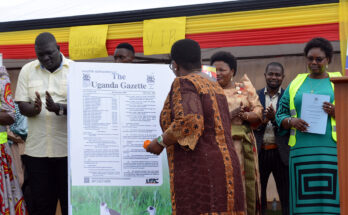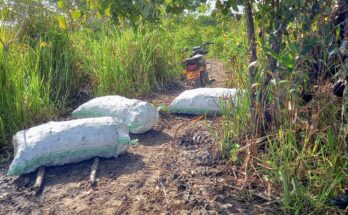Every time Fred Ggwayambadde harvests honey from his beehives, or crops from his garden, he thanks the trees.
But three decades it was a different story. Hemmed by large farmlands, his bee farming project was under threat as locals in his community began using synthetic pesticides to kill pests that were ravaging their crops. Ggwayambadde already knew that using pesticides was deadly to bees but the problem was he had no idea how to shield the social insects from the toxic chemicals.
“For sure I didn’t have any ideas,” says a 62-year-old farmer and a resident of Kasana village, Masaka district. “I didn’t know how to protect my bees because they have to survive on flowers which at times could be contaminated with pesticides”.
When he heard about a community out-reach session being carried out by East and Southern Africa Small-Scale Farmers’ Forum (ESAFF) in his village, Ggwayambadde decided to enroll. To his amazement, he learnt that agroforestry, a farming practice that involves growing crops and trees at the same time, can protect bees from toxic pesticides, maintain soil fertility, and at the same control soil erosion in your garden.
“A tree is a living wall that protects bees”
“I was told that trees can trap toxic chemicals that float in the air,” he says. “I decided to grow many trees after discovering that trees can act as a living wall that protects bees from pesticide chemicals,” says Ggwayambadde who makes and uses organic pesticides from some of the materials such as chilli, animal urine, neem leaves.

Research shows that pesticides can be harmful to bees twice – as larvae and adults – as they often get attracted to blooming flowers, which could be contaminated by the toxic chemicals. But planting trees, another study found, is one of the most cost-effective methods of filtering chemicals from the air through absorbing particles, odors, or pollutant gases that settle on the leaves of trees through the stomata, or ‘pores’.
Ggwayambadde planted trees around his six-acre garden, which also has 150 bee hives. His bee hives produce at least 8 litres of honey per harvest. Because of this, Ggwayambadde is able to look after his large extended family by selling honey – and its products such as wax, prepolis, venom.
As the effects of climate change – such as rising temperatures and unpredictable rainfall patterns – increasingly make it hard for communities that heavily rely on rain-fed agriculture to grow crops, farmers like Ggwayambadde are at least are able to combat climate shocks to some extent. Trees improve the micro- climate of an area, act as wind breakers, and they help in slowing soil erosion in the garden by controlling the speed of surface water run-offs in case it rains heavily.
“The falling leaves from the trees also form organic manure after decomposing which “adds more nutrients to the soil, which is for his crops, he says, adding that this growth is boosted by bees that help in pollinating crops.
Ggwayambade has diversified his garden as he plants several crops: fruit trees like mangos, jackfruits, guavas; food crops like maize, bananas, cassava and beans; and cash crops like coffee.
“I also sell coffee seedlings,” he adds. “I’m able to supply 15,000 every year to local famers”.

Growing a variety of crops – or intercropping – has numerous advantages, advises Ggwayambadde, because “the farming practice helps fight pest infestation, balance nutrients in soil, and also minimize crop loss” in case of climate shocks.
Weeds are also useful
A leader of Kimezze Farmers’ Group, Ggwayambadde has been training many farmer groups in his community on the importance of applying ecological principles of farming so that the same practices can be replicated widely.
Afsa Nakibuuka, 53, who has benefited from one of Ggwayambade’s training learnt how to turn weeds into organic manure instead of burning the unwanted plants.
“Many farmers look at weeds as invasive plants but I look at them as green gold,” she explains.” Weeds are nutritious for crops if you turn them into organic manure. All you have to do is dig them up, mix them with ash, saw dust and water before burying them in the soil to decompose. After a month you dig the compost and use it as manure”.
Nakibuuka advises farmers against clearing gardens through bush burning – a practice she says destroys the soil fertility and living organisms that help break down organic matter that can improve soil health.





